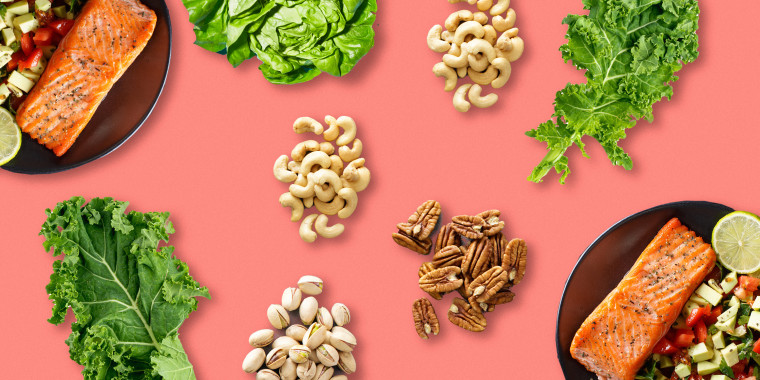Let’s get the bad news out of the way. There’s no magical diet that’s going to clear up your hypothyroidism. “I would be the first person to say, ‘Let’s try diet first,'” Bonnie Taub-Dix, a registered dietitian and author of “Read It Before You Eat It: Taking You from Label to Table,” told TODAY. “But in most cases, you need medication. Diet is a sidekick.”
The good news? The right diet can support your thyroid function and help you feel healthier, control your weight and boost your energy. First, a bit of background.
What is hypothyroidism?
Your thyroid is a small gland in the front of your neck. It makes hormones that regulate how your body uses energy. With hypothyroidism, your thyroid doesn’t make enough hormones, so your body slows down. About 4.6% of people in the U.S. have hypothyroidism. It’s much more common in women. It's also more common in people over age 60.
What are symptoms of hypothyroidism?
According to the National Institutes of Health (NIH), you may notice:
- Fatigue
- Weight gain
- Sensitivity to cold
- Joint and muscle pain
- Constipation
- Dry skin and hair
- Irregular menstrual periods and fertility problems
- Depression
- A slow heart rate
What causes hypothyroidism?
Though there are several possible causes, most often in the U.S., the cause of hypothyroidism is an autoimmune disorder called Hashimoto’s disease in which the immune system attacks the thyroid. The condition develops gradually so people often don’t notice symptoms for a long time.
Other conditions could cause the same symptoms as hypothyroidism. Your doctor can test your blood to find out if an underactive thyroid is causing your hypothyroidism symptoms. If that’s the case, you can treat hypothyroidism by taking medication to replace the hormone your thyroid would make.
What is the best diet plan for hypothyroidism?
Three nutrients — selenium, zinc and iodine — are involved in supporting your thyroid function, Samantha Cassetty, a registered dietitian and weight-loss expert based in New York City and the coauthor of “Sugar Shock,” told TODAY. You’ll want to make sure your hypothyroidism diet plan includes enough selenium and zinc.
According to the NIH, good sources of selenium are:
- Pork
- Beef
- Turkey
- Chicken
- Fish and shellfish
- Eggs
- Brazil nuts
And you’ll find zinc in:
- Oysters
- Red meat
- Poultry
- Beans
- Nuts
- Crab and lobster
- Fortified cereal
- Dairy foods
With iodine, you want to make sure you’re not overdoing it. (You need to have enough iodine, but low levels aren’t typically a problem in the U.S.) High amounts of iodine can make your hypothyroidism worse. The amount you get in your everyday diet shouldn’t be a problem unless you eat a lot of seaweed. Talk to your doctor if you take iodine supplements.
Because hypothyroidism can slow down your metabolism, it can lead to weight gain. So, the best foods for hypothyroidism are those that are part of a healthy overall diet. They can help you maintain an appropriate body weight and feel more energized.
“Eating more whole or minimally processed foods and cutting back on added sugars and heavily refined grains will help you feel more energetic,” Cassetty said. “You’re eliminating foods that tend to make you feel tired.”
She also recommends eating on a regular schedule to boost your energy. Three consistent meals a day, plus a snack if you need one, is a better routine than grazing, eating erratically or eating too lightly. “Those conditions sap your energy,” she said.
What foods should you avoid if you have hypothyroidism?
Generally, you can eat a balanced, healthy diet if you have hypothyroidism. Some people avoid gluten if they have hypothyroidism caused by Hashimoto’s disease. “For people with autoimmune diseases (like Hashimoto’s disease), it’s not uncommon to eliminate gluten,” Cassetty said.
Hashimoto's is commonly linked with celiac disease, and some studies suggest that people with Hashimoto’s may benefit from a gluten-free diet, even if they don't have celiac disease. The exact mechanism remains unclear, said Cassetty, but it's possible that gluten sparks an overreactive immune response in people with autoimmune conditions.
Some people with hypothyroidism limit soy. Cassetty recommends talking to your doctor if you eat a lot of soy. It’s possible that soy foods can interfere with your thyroid medication, but it might be OK to eat them several hours after you take your medicine.
Goitrogens — compounds that are found in cruciferous vegetables like broccoli, Brussels sprouts, cabbage and cauliflower — can impact the thyroid. But cooking these vegetables significantly reduces the goitrogens. “If they’re cooked, they should have much less effect than if you eat them raw,” said Taub-Dix. Again, talk to your doctor to find out if these are foods to avoid with hypothyroidism.
Whether you have hypothyroidism or not, you should avoid foods that give you little or no nutrition, like those that are high in added sugars and heavily processed refined grains. Cassetty also recommends limiting meat and keeping alcohol consumption within healthy limits.
While your diet won’t reverse hypothyroidism, it can help you feel better, maintain a healthy weight and be more energetic. Reach for nutrient-rich foods with an eye toward those that are high in selenium and zinc, and eat on a regular schedule. For more advice on the best diet for hypothyroidism, talk to your doctor.
Related:


